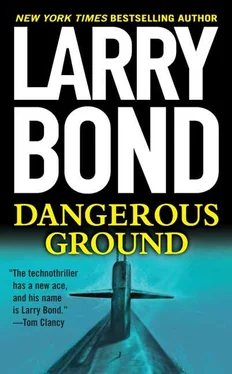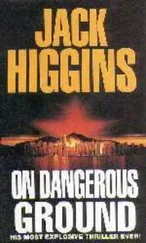Hardy’s voice showed more irritation. “I will not look at the chart because to do so might imply that there was a chance we’d actually do this. My orders are absolute, and I will remind you that you helped write those orders, and they are orders not just from the Chief of Naval Operations but the President himself.”
Dr. Patterson looked at Davis, as if for support, but Emily’s expression was carefully neutral. The silence in the torpedo room stretched on until, with nothing to say and thunderclouds on her brow, Patterson quickly walked out, almost running, to escape her frustration.
Hardy looked more than concerned, and Jerry wondered how this would read in her mission report — and Hardy’s. Finally the Captain’s features softened. He ordered, “Inform control as soon as you’ve recovered both the vehicles” and then he left.
June 11, 2005
Techeniye Guba, Novaya Zemlya
Late that afternoon, Jerry programmed the Manta for the fourth and last sortie. He still wondered about the barge they’d found earlier, but he wasn’t curious enough to go back and take a closer look.
He’d done enough diving to know that going inside a wreck was always hazardous. He’d never done it himself, but had heard plenty of horror stories about wreck divers who had come to grief. It was interesting, and exciting, and he’d try it someday, but not on an unknown vessel in foreign territory. Add the likely risk of radiation poisoning and it became a Very Bad Idea.
As they took stations for launch, Jerry didn’t know what to hope for. If they found nothing, Patterson would become even more frustrated. But he couldn’t feel sorry for someone who was hoping for bad news — especially someone who needed it for political gain. And the practical part of him, a very large part of him, actually, reminded himself that hoping wouldn’t change what was actually there.
Still, as the Manta ran its pattern, he found himself watching the screen as closely as he could. Nothing turned up for over two hours. When they finally detected something, though, it wasn’t the Manta.
“All stations, control, we have a Bear Foxtrot close aboard,” said the control room phone talker with urgency. With Memphis in shallow water, an ASW plane in the neighborhood could become a nightmare.
“Rig ship for ultra-quiet,” announced the IMC. Jerry could hear the ventilation fans being secured as Memphis stove to reduce her acoustic signature.
Hardy’s voice soon came on the sound-powered phone circuit. “Mr. Mitchell, I’m moving Memphis to deeper water immediately. How quickly can you follow with the Manta?” Even as Hardy asked the question, Jerry felt the sub begin a gentle turn to port.
Jerry still had over half the battery on the Manta. “I’ve got about four hours at ten knots. That’s my best quiet speed,” he added, anticipating Hardy’s next question.
“Then do it, mister. My speed will be five knots, course zero seven five.”
“Course zero seven five, U-bay aye.” Jerry killed the search program and sent a command to the Manta to head east. He also sent it as deep as the bottom allowed. Like Hardy with a smaller version of Memphis , he felt exposed and vulnerable in shallow water. At the same time, also like Memphis, he couldn’t use higher speed to escape to deeper water because the wake from the Manta’s passage might be visible on the surface.
“Sonar, U-bay. Where is the Bear now?”
“U-bay, sonar. He’s passing down our starboard side. To the south, passing west to east.”
Hence Hardy’s angling Memphis slightly north. Jerry mimicked the larger sub’s movements and ordered the Manta to the same course. He was more interested in avoiding detection than rejoining Memphis at this point. He had the range and speed to get it home.
The most immediate threat was a MAD detection. The Bear Foxtrot carried a magnetic anomaly detector in a short stinger on its tail. Memphis’ seven thousand tons of steel created a significant bend in the local magnetic field. With her so shallow, if the plane passed within half a mile, it would probably get a MAD hit.
The next biggest threat was sonobuoys. Would the Bear drop a field? Why would it choose this spot to do so? Was it looking for Memphis because someone had detected them? They hadn’t encountered any ASW planes in the nearly two weeks they’d been in the Kara Sea. Was this just a random patroller? Was it on a training flight?
Jerry got that “submariner feeling,” the urge to crouch, an itch between his shoulder blades that could only be scratched by deep water. He mentally plotted an intercept with Memphis and adjusted the Manta’s course accordingly. As it moved away from the shore, the water depth increased and Jerry concentrated on hugging the bottom. It not only reduced the Manta’s detectability, but it gave him something to do.
With the Manta in a tail chase, it took over an hour to reach Memphis, still moving away from the coast and heading for deeper water. Hardy slowed just long enough for Jerry to recover the Manta and then he increased speed, moving farther and farther away from the coastline.
Jerry headed up to control, curious about the Bear. He found Hardy and the XO standing over the plotting table, occasionally staring at the plane’s track on the fire-control display, or at least the portion that Memphis had observed. Several classified documents were open, including one titled Russian Northern Fleet Operational Deployments, 2003–2004.
Bair read from another booklet with a red-striped cover. “The nearest airfield known to have Tu-142 Bear Foxtrots is at Arkhangelsk. That’s about six hundred miles as the seagull files.”
“That’s a long way to come,” Hardy commented darkly.
“Not for a Bear, sir. He’s got great legs. But it’s a good distance for a training mission, about an hour and a half each way.”
“If that was a training mission, they almost hit the jackpot. I don’t like it, XO, it’s too damn coincidental.”
“What would they have done if they’d spotted us?” asked Patterson.
“Reported us. Sent more planes to track us,” ventured Hardy.
“Lined up the Northern Fleet across the north edge of the Kara Sea,” added Bair. “They’d be mad as hornets to find us here, but they’d also do everything possible to keep us from leaving, at least until they had proof of our presence.”
“But we’re in international waters,” protested Patterson.
Hardy answered, “If they detect us, they may or may not get a good fix on our position. We certainly wouldn’t do anything to help them. Skirting the twelve-mile limit like we’ve been, a Russian commander would be reasonable to assume we’re in his waters — or have been — until proven otherwise. We, or more properly, the U.S. Government, would have to provide proof that we weren’t. And along the way explain why we’re there at all.”
“Messy. Embarrassing.” Bair commented.
“And bad for the mission.” Hardy added. “If I had my druthers, Doctor, I’d head north right now and call it a mission.” Seeing the panicked expression on her face, he quickly added, “But I owe you one more Manta sortie.” His expression was grim as he said it and he cautioned, “But we will leave the area the instant we’ve finished searching Techeniye Guba, or if I see another Russian naval unit. I get the feeling we’ve used up our good luck.”
They remained in deep water, well off the coast, for several more hours. There was no point in returning any sooner, because the Manta had to recharge its batteries.
As the UUV neared its full charge, Hardy brought Memphis back in position at little more than creep speed. He picked a spot that put the Manta in range of its search area, but also left Memphis a short distance from deeper water, or as deep as it got in the Kara Sea.
Читать дальше












